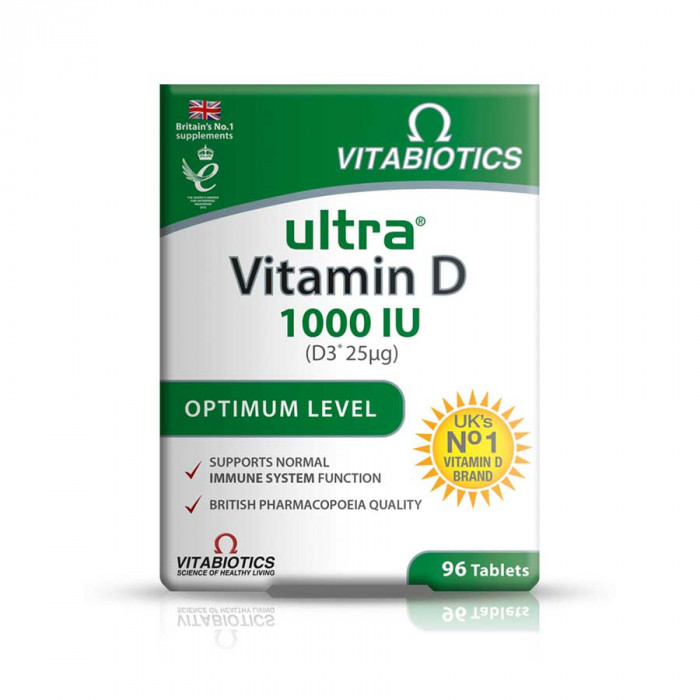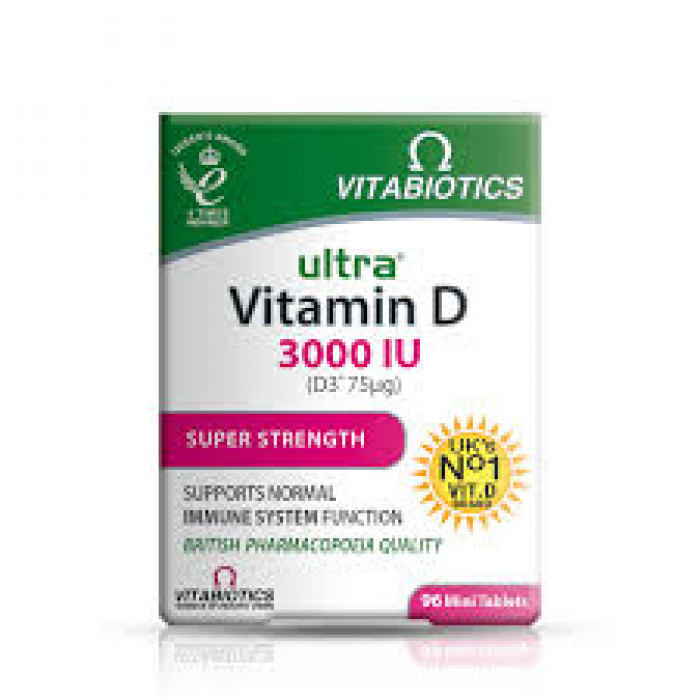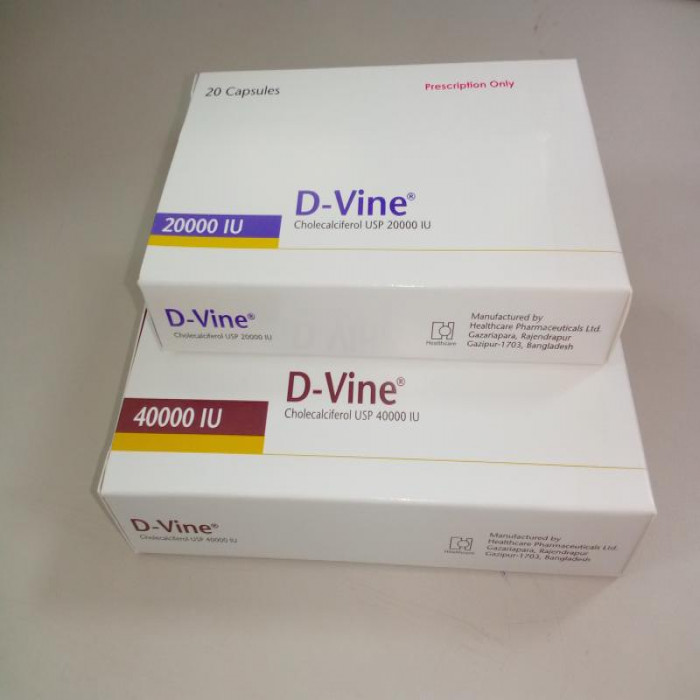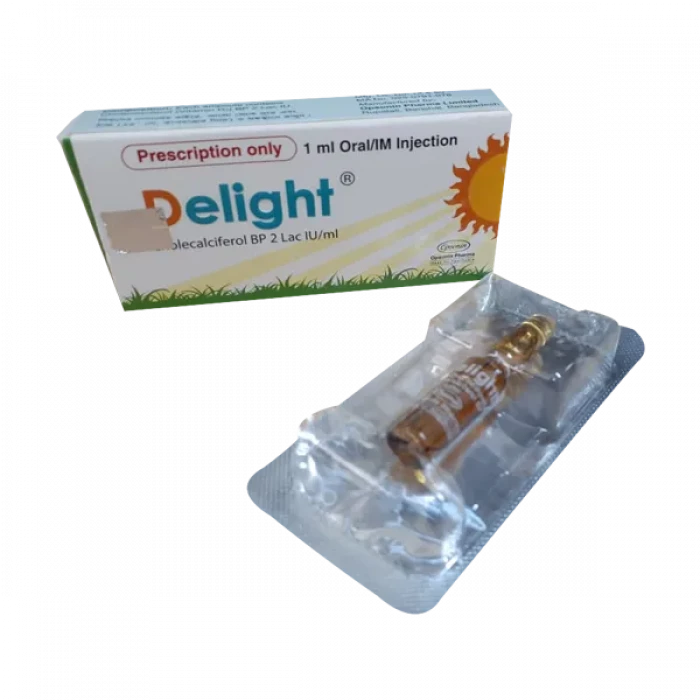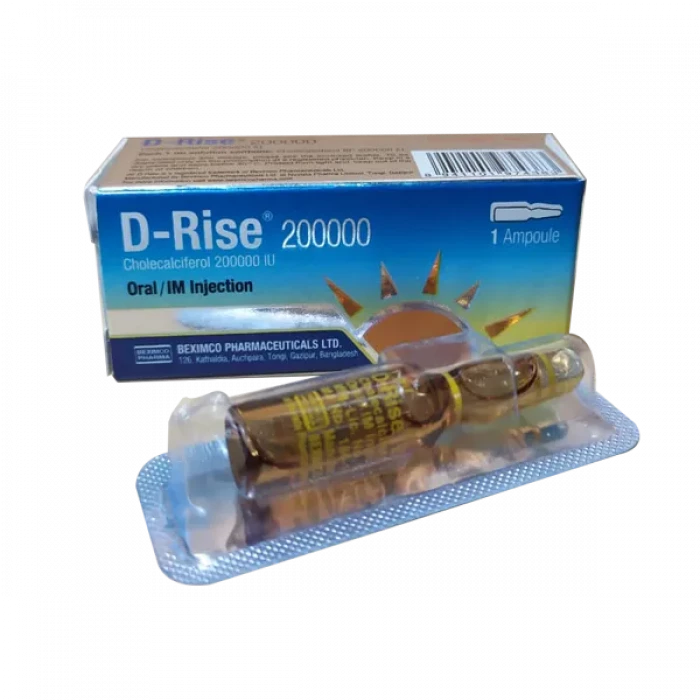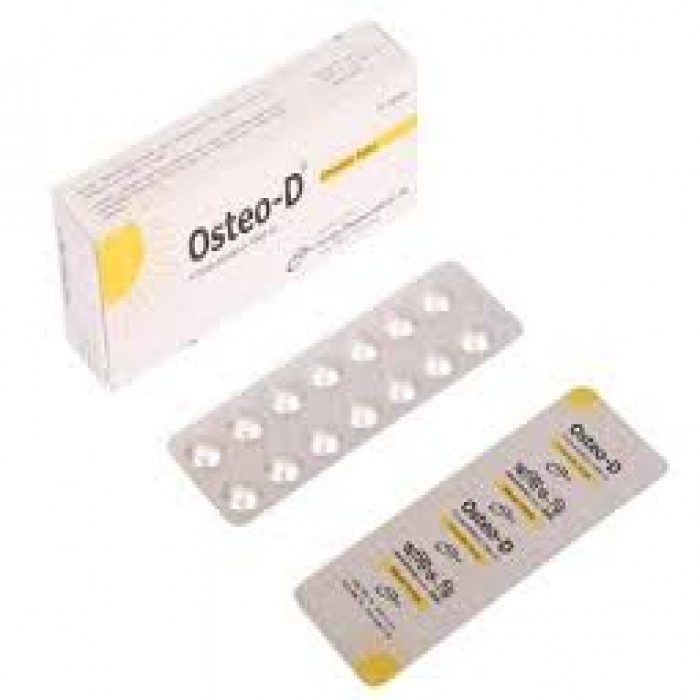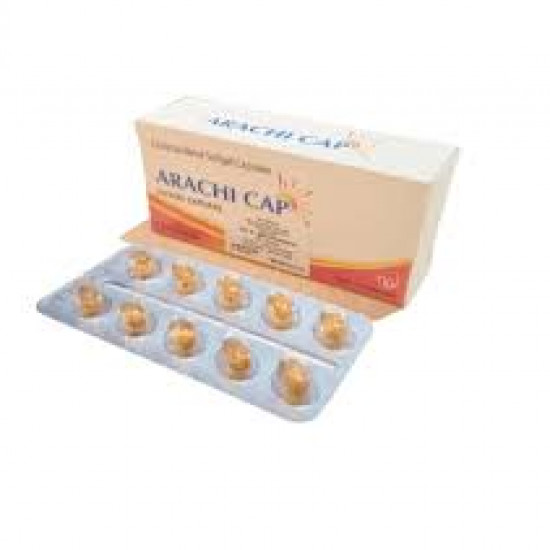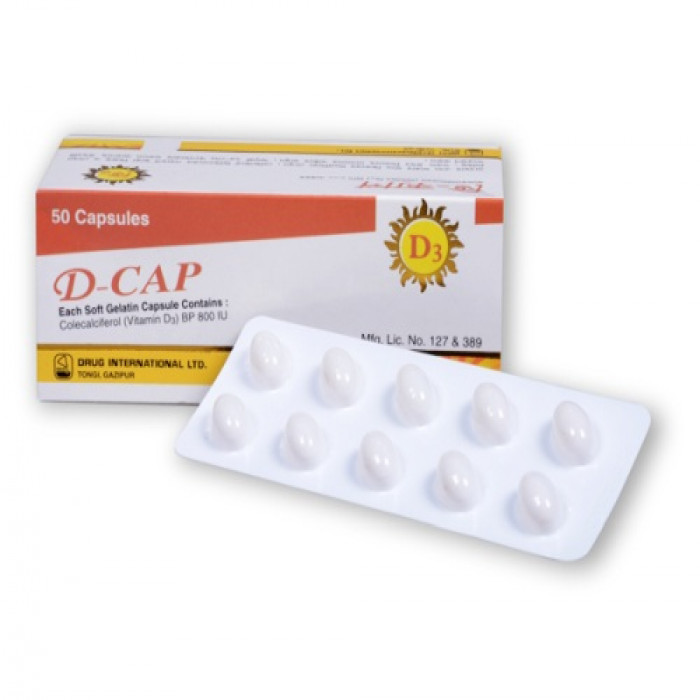
✔ 100% Authentic Product
👁️ Currently Viewing 4688
D-Cap 800IU Capsule
Cholecalciferol, also known as Vitamin D3, is commonly used to treat and prevent insufficiency of Vitamin D3. It is effective in raising Vitamin D levels in individuals who are deficient. Additionally, in specific cases of osteoporosis treatment, cholecalciferol can be used as a supplement alongside other therapies.
By providing the body with an adequate supply of Vitamin D3, cholecalciferol helps maintain healthy bone density and calcium absorption. It plays a crucial role in bone health and overall well-being.
Discount
Price: ৳ 57
MRP:
৳
60
5%
Off

100% Genuine Products, Guaranteed

Safe & Secure Payments, Always

Fast, Secure & Efficient Delivery

Proper Packaging
 Cash on Delivery - All over Bangladesh
Cash on Delivery - All over Bangladesh Regular Delivery - 12-24 Hours, Dhaka City* Charge Tk.39-59
Regular Delivery - 12-24 Hours, Dhaka City* Charge Tk.39-59 Regular Delivery - 24-48 Hours, Other Cities* Charge Tk.99-110
Regular Delivery - 24-48 Hours, Other Cities* Charge Tk.99-110
 ফ্রি ডেলিভারিঃ - ৯৯৯ টাকা+ অর্ডারে, ঢাকা
শহরে
ফ্রি ডেলিভারিঃ - ৯৯৯ টাকা+ অর্ডারে, ঢাকা
শহরে ফ্রি ডেলিভারিঃ - ২৯৯৯ টাকা+ অর্ডারে, ঢাকার
বাহিরে
ফ্রি ডেলিভারিঃ - ২৯৯৯ টাকা+ অর্ডারে, ঢাকার
বাহিরে
100% Genuine Products, Guaranteed
Safe & Secure Payments, Always
Fast, Secure & Efficient Delivery
Proper Packaging
 Cash on Delivery - All over Bangladesh
Cash on Delivery - All over Bangladesh Regular Delivery - 12-24 Hours, Dhaka City* Charge Tk.39-59
Regular Delivery - 12-24 Hours, Dhaka City* Charge Tk.39-59 Regular Delivery - 24-48 Hours, Other Cities* Charge Tk.99-110
Regular Delivery - 24-48 Hours, Other Cities* Charge Tk.99-110 ফ্রি ডেলিভারিঃ - ৯৯৯ টাকা+ অর্ডারে, ঢাকা
শহরে
ফ্রি ডেলিভারিঃ - ৯৯৯ টাকা+ অর্ডারে, ঢাকা
শহরে ফ্রি ডেলিভারিঃ - ২৯৯৯ টাকা+ অর্ডারে, ঢাকার
বাহিরে
ফ্রি ডেলিভারিঃ - ২৯৯৯ টাকা+ অর্ডারে, ঢাকার
বাহিরে
✅ Description:
- D-Cap 800IU Capsule is a nutritional supplement designed to address the nutritional gap in daily life. It combines calcium and vitamin D3, both of which play crucial roles in maintaining overall health.
- For treatment and prevention of Vitamin D and calcium deficiency.
- As an adjuvant for the treatment and prevention of osteoporosis and bone disorders.
- As a supplement when the Vitamin D requirement of the body is high such as in the elderly, after surgery, and in growing children.
- Overall, D-Cap 800IU Capsule offers a convenient way to bridge the nutritional gap and support bone health. However, it's important to note that individual nutritional needs may vary, and consulting with a healthcare professional is always recommended before starting any new dietary supplement.
Safety Advices

Alcohol
UNSAFE
It is recommended to restrict alcohol consumption while taking D-Cap 800IU Capsule as alcohol can interfere with the absorption of calcium.

Pregnancy
CONSULT YOUR DOCTOR
D-Cap 800IU Capsule can be used during pregnancy, but it is important to consult your doctor for the appropriate dosage. Overdosing on Calboral-DX during pregnancy can potentially harm the baby's physical and mental health, cause retinal diseases, and lead to supra valvular aortic stenosis (a heart defect).

Breastfeeding
CONSULT YOUR DOCTOR
D-Cap 800IU Capsule can be used during breastfeeding. It may pass through breast milk, hence it should be considered while taking this medicine. Consult your doctor before taking Calboral-DX.

Driving
SAFE
D-Cap 800IU Capsule is usually safe and does not interact with your driving ability.

Kidney
CAUTION
D-Cap 800IU Capsule is not recommended to be taken for patients diagnosed with kidney stones, increased levels of calcium in urine or blood, and severe kidney impairment. Calboral-DX should be taken with caution in patients with impaired renal function. Consult your doctor before taking D-Cap 800IU Capsule.

Liver
CAUTION
D-Cap 800IU Capsule can be used in patients with liver impairment with no dose adjustments. Consult your doctor before taking D-Cap 800IU Capsule.
✔️ Uses of D-Cap 800IU Capsule
Used to prevent and treat calcium deficiency in conditions like
- Osteoporosis
- Osteomalacia or rickets
- Hypoparathyroidism
- Pregnancy or breastfeeding
✔️ Side Effects of D-Cap 800IU Capsule
Flatulence, Diarrhea, Constipation, Upper GI discomfort, etc. are rare manifestations. Hypercalcaemia due to prolong use has rarely been reported. Consult your doctor if you notice any such effects while taking it.
✔️ How does D-Cap 800IU Capsule work?
Cholecalciferol helps maintain blood calcium and phosphorus levels and mineralization of bone.
✔️ Quick Suggestions:
- It contains calcium carbonate and vitamin D3, that is beneficial to keep your bones healthy and strong
- Vitamin D3 helps to enhance calcium absorption for better bone health
- Calcium is essential for the normal functioning of cells, muscles, and bones
- It maintains healthy bones, immunity, and dental health and supports muscle function
- Include dairy products like milk, yogurt, cheese, or milk-based custard in your diet.
- Eat daily a serving of broccoli, cabbage, bok choy, spinach, and other green leafy vegetables.
- Include the best dietary sources of vitamin D, such as fish liver oils and vitamin D–fortified milk.
- Snack on calcium-rich nuts like Brazil nuts or almonds.
- Sprinkle sesame seeds over your food, vegetables, and salads. Sesame seeds are high in calcium.
- Avoid or reduce the intake of caffeine, soft drinks, and alcohol that inhibit calcium absorption.
- Replace the meat with tofu or tempeh for extra calcium in your food.
✔️ Indication of D-Cap 800IU Capsule
- D-Cap 800IU Capsule is used for Nutritional Deficiencies
✔️ Pharmacology
Cholecalciferol (Vitamin D3) aids in calcium and phosphorus absorption and reabsorption. Vitamin D3 is required for optimal bone growth and density maintenance. It also helps type 2 diabetes patients maintain optimal insulin levels by reducing the severity of bacterial infection, improving lung function, reducing the risk of cancer (breast, colorectal), and preventing cancer (breast, colorectal).
✔️ Dosage & Administration of D-Cap 800IU Capsule
For capsules containing Vitamin D3, the recommended dosages for different populations are as follows:
For Adults:
- Treatment of Vitamin D3 deficiency: A dosage of 40000 IU (International Units) once weekly for a duration of 7 weeks is recommended. After the initial treatment, maintenance therapy typically involves a daily dosage ranging from 1400 to 2000 IU.
- It is advisable to measure the levels of 25-hydroxyvitamin D, which is used to confirm the target level, approximately 3 to 4 months after initiating the maintenance therapy.
- Prevention of Vitamin D3 deficiency: A dosage of 20000 IU is recommended every 4 weeks. In certain situations, higher doses may be required.
- Addition to specific therapy for osteoporosis: A dosage of 20000 IU once a month may be prescribed along with other therapies targeting osteoporosis.
For Children aged 12 to 18 years:
- Treatment of Vitamin D3 deficiency: A dosage of 20000 IU once every 2 weeks for a period of 6 weeks is recommended.
- Prevention of Vitamin D3 deficiency: A dosage of 20000 IU every 6 weeks is recommended.
It is important to note that these dosages are general recommendations, and individualized treatment plans should be determined by healthcare professionals based on the specific needs and circumstances of each patient.
✔️ Interaction
- Thiazide diuretics, calcium, or phosphate: Taking vitamin D supplements concurrently with these substances may increase the risk of hypercalcemia, a condition characterized by high levels of calcium in the blood.
- Antiepileptic drugs (carbamazepine, phenobarbital, phenytoin, and primidone): These medications may increase the body's vitamin D requirements, potentially affecting its effectiveness. Close monitoring and adjustments in vitamin D dosage may be necessary.
- Rifampicin and isoniazid: These drugs may reduce the efficacy of vitamin D. Additional monitoring and dosage adjustments may be required.
- Corticosteroids: Corticosteroids may counteract the effects of vitamin D. Careful monitoring and adjustment of vitamin D supplementation may be necessary when using corticosteroids.
- Digoxin or cardiac glycosides: Concurrent use of vitamin D supplements with these medications may increase the risk of digitalis toxicity. Monitoring and dosage adjustments may be needed.
- Cholestyramine, colestipol, mineral oil, orlistat: These substances can interfere with the absorption of vitamin D, leading to reduced effectiveness. Taking vitamin D and these substances should be spaced apart to ensure optimal absorption.
- Ketoconazole: Ketoconazole may interfere with the metabolism of vitamin D. Close monitoring and potential adjustments in vitamin D dosage may be necessary.
It is essential to inform your healthcare professional about all the medications, supplements, and substances you are taking to ensure proper monitoring, and dosage adjustments, and minimize the risk of interactions. They can provide personalized guidance based on your specific circumstances.
✔️ Contraindications
Cholecalciferol, also known as vitamin D3, has certain contraindications and should be avoided in specific situations. These include:
- Diseases associated with hypercalcemia: Colecalciferol is contraindicated in conditions characterized by high levels of calcium in the blood, as it can further increase calcium levels and worsen hypercalcemia.
- Hypersensitivity: Patients with known hypersensitivity or allergic reactions to cholecalciferol or similar medications within the same class should avoid its use.
- Vitamin D toxicity: If there is evidence of vitamin D toxicity, cholecalciferol should not be used. Vitamin D toxicity can occur due to excessive intake of vitamin D, leading to elevated blood calcium levels and related symptoms.
It is crucial to consult with a healthcare professional or physician before starting cholecalciferol supplementation to ensure it is safe and appropriate for your specific medical condition and any potential contraindications.
✔️ Pregnancy & Lactation
Studies have indicated that doses up to 4000 IU of vitamin D3 are safe to use during pregnancy. The recommended daily intake for pregnant women is generally around 400 IU; however, if a woman is vitamin D3 deficient, a higher dosage may be necessary. It is important for pregnant women to follow their doctor's advice, as their individual needs may vary depending on the severity of their deficiency and their response to treatment.
When it comes to breastfeeding, vitamin D3, and its metabolites are excreted in breast milk. There have been no reported cases of overdose in newborns due to excessive vitamin D3 intake from breast milk. However, if additional vitamin D3 is being given to the breastfed infant, the healthcare practitioner should consider the dosage of any supplemental vitamin D3 being given to the mother.
It is crucial for both pregnant and breastfeeding women to consult with their healthcare provider for personalized advice and guidance regarding vitamin D3 supplementation. The healthcare provider can assess the individual's specific needs and ensure appropriate dosage recommendations are provided.
✔️ Precautions & Warnings
Caution should be exercised by individuals with the following conditions when considering vitamin D supplementation:
- High blood calcium or phosphorus levels: People with elevated levels of calcium or phosphorus in their blood should be cautious when taking vitamin D supplements, as it can further increase these levels.
- Heart problems: Individuals with heart problems should exercise caution when taking vitamin D supplements. It is advisable to consult a healthcare professional before starting any supplementation.
- Kidney disease: Individuals with kidney disease should be cautious when taking vitamin D supplements, as impaired kidney function can affect the body's ability to process and regulate vitamin D.
- It is important to note that vitamin D supplementation should be accompanied by adequate levels of calcium and magnesium. When the body has low calcium levels, the parathyroid gland is activated, leading to the production of parathyroid hormone (PTH). This hormone triggers the production of vitamin D and aids in the release of calcium from the bones for essential functions like neutralizing body acidity.
- Regarding lactation, it is advised to use caution when taking vitamin D supplements as the drug can be distributed into breast milk. It is recommended to consult with a healthcare professional before using vitamin D supplements while breastfeeding.
As always, it is essential to consult a healthcare professional for personalized advice and guidance regarding the use of vitamin D supplements, especially for individuals with specific medical conditions or during lactation
✔️ Storage Conditions
Keep below 30º C temperature, protected from light & moisture. Keep out of the reach of children.
⚠️Disclaimer:
At ePharma, we’re committed to providing accurate and accessible health information. However, all content is intended for informational purposes only and should not replace medical advice from a qualified physician. Please consult your healthcare provider for personalized guidance. We aim to support, not substitute, the doctor-patient relationship.




